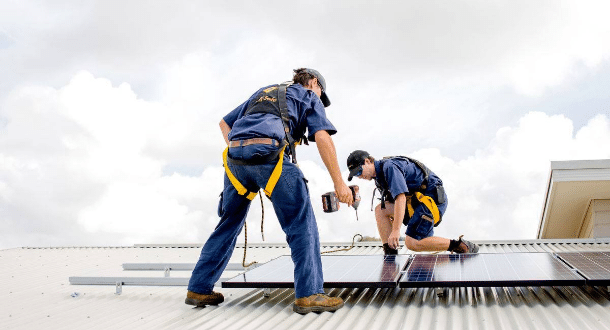Victorians go to the polls on Saturday, and Labor’s Daniel Andrews, the Coalition’s Matthew Guy and Greens leader Samantha Ratnam have been spruiking their election energy policies across the state.
With cheaper and cleaner electricity now priorities for many Victorians, energy announcements have been a focus of this year’s campaigning.

Energy Matters has been over the detail and put together this guide to energy initiatives from the three major parties.*
Labor election energy policies
Labor’s Victorian Solar Homes program announced in August is a rebate covering $2,225 of the solar system installation costs for eligible households.
Initially the program was for 24,000 homes. If re-elected, Premier Daniel Andrews promises to expand the program to 700,000 homes from July next year.
Earlier this month the government said it would extend the Solar Homes program to include renters if re-elected. Landlords will have to strike a deal with their tenants to share the cost of solar installation. Renters then make a 25 per cent contribution through a rent levy spread over four years. The landlord and government rebate covers the rest of the cost.

Owners corporations will also be eligible to receive the 50 per cent rebate on solar installations.
A re-elected Andrews Labor Government will also provide half-price solar batteries for 10,000 Victorian households that already have solar panels. This will help them save on their electricity bills by storing solar energy for use in the evenings.
Under its Victorian Renewable Energy Target (VRET), Labor is already aiming for 40 per cent renewable energy use state-wide by 2040. However, if re-elected it will increase this target to 50 per cent renewable energy by 2030.
Labor has also promised to ban cold calling by energy providers and double the fines for wrongly disconnecting customers to $250,000.
The Greens election energy policies
Led by Samantha Ratnam, the Victorian Greens want to increase the Victorian Renewable Energy Target (VRET) to 100 per cent of the state’s energy by 2030.

The Greens’ energy policy also phases out all coal-fired power stations by 2030. It includes building $9 billion worth of publicly-owned, large-scale renewable energy generators.
Believing that privatisation has driven up electricity prices, the Greens will establish Power Victoria as a publicly-owned, clean electricity retailer. Power Victoria will not make a profit, but will run ‘at cost’.
By removing the marketing and profit components from an average annual Victorian power bill of $1,457, the Greens estimate Power Victoria would save customers $321.60 annually.
In addition, the Greens want to:
- Install solar panels and batteries in every Victorian public school;
- Reduce power bills for the Victorians who need it most by putting solar panels on 24,000 free-standing public housing homes; and
- Support all households to be a part of the solar revolution by providing $1,000 grants for renters and people living in apartments to buy solar panels in solar gardens on public buildings, like train stations.
Liberal Nationals Coalition election energy policies
Under Liberal leader Matthew Guy, the Liberal National Coalition energy platform hinges on the construction of a new power station of at least 500 MW.

Frontier Economics modelling for the Victorian Liberals shows this will save average households around $355 annually, small businesses around $860 and larger ones around $1,720.
The winning bid with the lowest electricity cost could include hydro, wind, solar power, gas or coal or a combination of any. However, it must be new capacity and available to supply electricity 24/7.
The Coalition will help Victoria’s community organisations cut their power bills with a $4 million Community Solar Grants Program.
Under a Liberal Nationals Government all Victorian public schools without solar power will be eligible for solar and battery systems. In addition, schools will receive grants of $10,000 to assist with implementation costs.
The program would provide over 700 Victorian public schools with solar. The aim is having 100 per cent of suitable public schools equipped with solar photovoltaic systems by 2025.
Matthew Guy has pledged to keep the Yallourn coal-fired power station operating until its scheduled closure in 2032. The Coalition also wants to lift Labor’s ban on onshore gas drilling.
Finally, the Coalition will remove the Victorian Renewable Energy Target (VRET) which it believes has contributed to high electricity prices.
*One Nation and the Australian Conservatives are not running candidates in the Victorian Election so their energy policies are not included here.
Our professional solar installers in Melbourne will assess and determine your energy needs. We customise a solar panel system in Melbourne to fit the roof size of your property, ensuring you receive the most suitable solar panel system for your Melbourne home, meeting to property’s energy requirements.













































